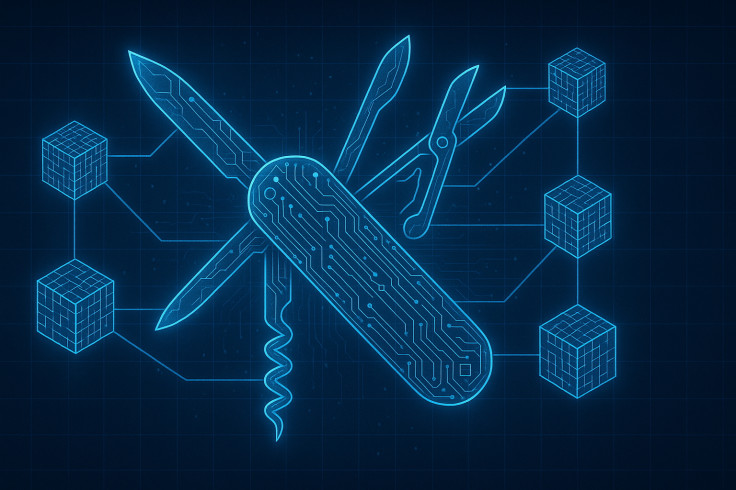From Blades to Blockchain: TG3 Unveils A New Model for iGaming Trust
TG3 Transforms iGaming with Blockchain, Collaboration, and a Swiss Army Knife Approach to Trust

Karl Elsener was one of the most respected Swiss cutlers of his day. He was also very patriotic, and in learning that Swiss soldiers of the early 1880s were being issued underwhelming German-manufactured knives, he took bold action. By forming both Victorinox and the Swiss Cutlers' Association, he mobilised the most talented hardware manufacturers of the day and aligned specialists of different components, each contributing distinct expertise that, when combined, created the timeless innovation we now know as the Swiss Army Knife. Elsener's process represents one of the earliest examples of collaborative innovation, in bringing together specialists from different disciplines to form an ecosystem of expertise.
Well over a century later, in a very different sector with a very different tech stack, Swedish Swiss investment company TG3 has applied that same strategy of collaborative innovation to the iGaming industry. By combining blockchain, smart contracts, and digital finance, TG3 has focused on establishing a more credible and accountable framework for online gaming with a range of tech innovators. An approach which has established new mechanisms for trust, oversight, and even fairness in digital play.
And this month on November 12th at The Bridge Conference in New York, TG3 will unveil this integrated toolkit publicly and outline how the company believes this technology can deliver the visibility and accountability that has long been lacking in the space.
"We believe the future of online gambling is transparent, decentralised, and blockchain-driven. We're not just building a platform, we're redefining trust, fairness, and engagement in iGaming," explains TG3 CEO Johan Lundberg, whose background spans the investing, fintech, and payments markets across Northern Europe.
Corralling A Toolkit of Tech Collaborators
Founded in 2025, with a dual base in Stockholm and Zurich, TG3 evolved from the convergence of fintech investment and gaming infrastructure design. From this foundation, the company has focused on addressing the structural issues that have limited integrity in the space. Together with its partners, it is developing a network of companies focused on improving transparency and scalability across the sector with clear benefits to all industry stakeholders.
But building a multipronged collaborative iGaming ecosystem is more complex and timely than simply aligning some of the best Swiss metalworkers from the 19th century (with all due respect to dear Karl).
As TG3's CCO Louise Nylén, whose career spans strategically integrating tech across medtech, fintech, and gaming, explains, building a resilient framework is both a holistic and technical process that takes time, identifying core issues, shaping a strategic vision, and bringing in the right partners to add value.
"Our aim with the ecosystem is to integrate through large parts of the value chain, bringing together companies with clear synergies and thus creating a multiplier effect within the group portfolio," notes Nylén.
Building a Practical Blockchain Ecosystem
To realise the company's current ecosystem, TG3 has assembled a group of partners and portfolio companies across fintech, compliance, and gaming architecture, which all form distinct, functioning yet integrated tools, much like the Swiss Army knife.
Some of the key companies within its expanding portfolio include a Web3 gaming platform, a decentralised liquidity provider, a casino built on openness, provably fair gameplay with instant payouts, and a regulated stablecoin payments solution, among others. Working with the Etherlink blockchain, these entities form a practical framework supporting scalable and accountable systems across the sector.
Given the industry's projected value of more than $770 billion and its rapid digital growth, the opportunity for blockchain to redefine trust and value creation in the space is immense.
According to the company, this truly embodies the concept of GambleFi, the merge between online gambling and blockchain technology, where its principles of oversight and trust are applied, measured, and refined in real conditions.
The Sharpest Tool Yet?
Today, long after crafty Karl corralled a group of Swiss craftsmen to build a better domestic tool for soldiers, his Victorinox has gone on to sell hundreds of millions of Swiss Army knives worldwide, still producing more than ten million last year across 400 models, with some offering as many as 73 functions.
What began as the product of collaboration endures as a masterclass in collective ingenuity, a lesson that still stands today, even in the digital age, where the best innovations are rarely built alone.
© Copyright IBTimes 2025. All rights reserved.





















